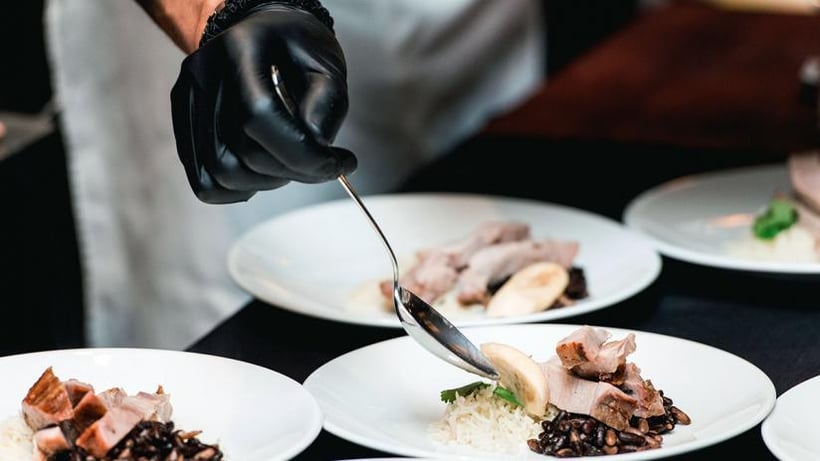
While catering businesses need to follow the same food safety standards required for restaurants, having to transport food, work at unfamiliar venues and change menu requirements means there are a few unique food safety challenges that caterers should consider.
Prepare your business for these challenges with these top 4 tips for keeping food safe in catering!
1. Check the venue facilities
All food businesses must follow proper food safety practices such as cooking food to safe temperatures, preventing cross-contamination and using the correct cleaning and sanitisation procedures. For caterers, this can be challenging when preparing food at different venues because they may be unfamiliar with the space, and the proper facilities may not always be available as they would be at a restaurant.
Before finalising an event contract, caterers should review the venue facilities to ensure they are up to food safety standards. Helpful questions to ask include:
- Is there a kitchen at the venue that comes with adequate fridge and freezer space?
- Does the kitchen have a stovetop and oven that can accommodate the type of meals and number of dishes to prepare?
- Is the kitchen adequately laid out with ample counter space so that you can separate raw foods from ready-to-eat foods, as well as allergens, to help prevent cross-contamination?
- Can the number of outlets accommodate the equipment you’ll need?
- Is there running hot and cold potable water?
Checking facility capabilities will help caterers determine whether they can prepare the food at the venue or if they will need to transport cooked food from another location. Remember to do this before committing to catering the event!
2. Be prepared with the right equipment
From dishware, to table settings to food displays, caterers are familiar with needing equipment to transport, prepare and serve their food properly. When it comes to food safety, there are specific equipment that caterers should always remember to bring or confirm if readily available at the venue, which includes:
- sanitary preparation and serving tools such as cutting boards, serving trays and tongs or spoons for serving
- gloves, cleaning supplies and waste and compost bags
- reheating tools such as a cooking range, oven, microwave or steamer
- hot holding equipment to keep food at the safe temperature for the whole event, such as hot holding trays that can keep food at 60°C or above
- display units for cold foods that can be pre-chilled to 5°C or below
- properly calibrated thermometers to check that food is being kept at the right temperatures throughout the whole event
- additional uniforms and aprons to ensure staff clothing is kept clean, sanitary and presentable
3. Plan for transporting food
Caterers must ensure that food is kept at the right temperature when transporting food to help prevent harmful bacteria from growing. Foods must be kept to temperatures of:
- 60°C and above for hot foods
- 0°C to 5°C for cold foods
- -15°C or below for frozen foods
A few tips that caterers should keep in mind when transporting food:
- Insulated food pan carriers, insulated thermal liners and refrigerants can help keep food hot or cold.
- Keep cold foods separate from foods that could spoil at low temperatures.
- Outdoor coolers can be used to transport drinks and ice.
- Keep different foods and ingredients in food-safe containers that can be easily separated to help prevent cross-contamination.
- Factor in travel time to the venue and potential traffic to determine what equipment you’ll need to make sure food is kept safe during transportation.
4. Practise proper allergen management
As with all food businesses, caterers should prioritise proper allergen management to help protect their clients and guests from experiencing an allergic reaction. With potentially different menu options and dietary restrictions for each event, staying on top of allergen management could pose more unique challenges for caterers.
When setting the menu for an event, ask clients about any dietary restrictions to keep in mind such as vegetarian, vegan and gluten-free options as well as allergy requirements. If you have a set menu in place that can accommodate these dietary requirements, make sure this information is added on the menu or catering brochure.
Ensure that your client and their event guests can easily get the information that they need; have ingredient information readily available and add known allergens on the menu. Train servers to know all of the ingredients in each dish and whether there are any known allergens that could cause an allergic reaction.
Following standard food safety measures, such as practising proper hand hygiene and preventing cross-contamination, helps with allergen management. The AIFS Guide to Allergen Management for Food Businesses provides comprehensive information on how your business can protect customers from experiencing an allergic reaction.
Getting proper food safety training for your staff goes a long way in keeping food safe and helping your catering business succeed. The Australian Institute of Food Safety’s nationally recognised Food Safety Courses provide comprehensive training in safe food practices to help address challenges your catering business may face.





